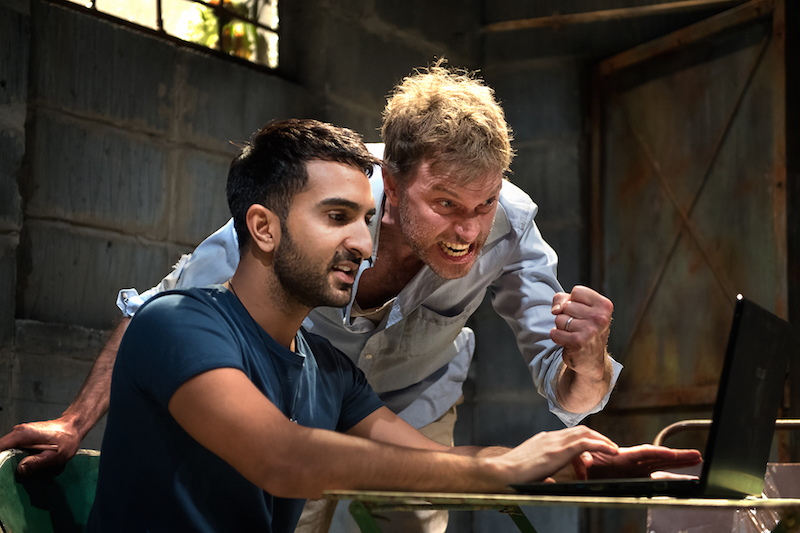The Invisible Hand, Tricycle Theatre | reviews, news & interviews
The Invisible Hand, Tricycle Theatre
The Invisible Hand, Tricycle Theatre
New play that examines global economics and radical Islam is right on the money

In the long tradition of fictional characters who embody their monikers, the naming of Nick Bright hardly counts as the most colourful, but it has a sardonic edge. Clearly the young American banker at the centre of Ayad Akhtar’s tight political thriller is too bright for his own good.
Fat chance, he reasons, and persuades his captors to allow him to raise his own ransom by doing what he knows best: playing the markets. Thus a desperate situation whose details are all too grimly familiar – heat, dirt and the torture of the daily possibility of violent death – takes a screeching handbrake turn into Gordon Gekko territory. Except that in place of a gleaming trading floor on Wall Street, this is an eight-by-ten breeze-block shed where the sole trader never gets to take a shower or change his clothes. Worse, he's forbidden to touch a computer.
 Thus the playwright sets up not only a car crash of cultural opposites – First World vs Developing World, capitalism vs Islamic idealism – but also an intriguing relationship. This is the complicated co-dependence that develops between Princeton-educated Nick (Daniel Lapaine) and his hotheaded captor Bashir (Parth Thakerar, pictured with Lapaine above). The latter is a resentful native of Hounslow, innit, whose disgust at his own parents for choosing what he sees as the soft option of migrating to Britain comes a close second to his loathing for rich Americans.
Thus the playwright sets up not only a car crash of cultural opposites – First World vs Developing World, capitalism vs Islamic idealism – but also an intriguing relationship. This is the complicated co-dependence that develops between Princeton-educated Nick (Daniel Lapaine) and his hotheaded captor Bashir (Parth Thakerar, pictured with Lapaine above). The latter is a resentful native of Hounslow, innit, whose disgust at his own parents for choosing what he sees as the soft option of migrating to Britain comes a close second to his loathing for rich Americans.
Bashir has the laptop, Nick the know-how. And in the course of Nick’s teaching the scratchy Bashir the principles of economics, he teaches the audience too. We learn about futures, short trading, and how money can be made from a falling currency. More sinisterly, we also learn the value of insider information and the depth of the moral quicksand that surrounds it. Nick makes several hundred thousand dollars by shorting the assets of a controversial Pakistani businessman hours before the man is assassinated by a suicide bomber.
 Soon enough, of course, the wannabe revolutionary Bashir is hooked on playing the markets, and the high-minded Imam (Tony Jayawardena), who claims that Nick and Bashir’s trading profits are buying vaccines for local children, is taking a cut for himself. The play makes sharp observations on the way anti-American hostility has grown out of global inequality and envy, but also argues that opportunism and greed are universal. Self-interest, far from being a stabilising force – the "invisible hand" as envisioned by Adam Smith in 1759 – is shown to be an agent of chaos. Before long, Nick is finding ways to play his captors off against one another – even his sympathetic jailer Dar (Sid Sagar, pictured above with Parth Thakerar) – with unforeseeable and devastating results.
Soon enough, of course, the wannabe revolutionary Bashir is hooked on playing the markets, and the high-minded Imam (Tony Jayawardena), who claims that Nick and Bashir’s trading profits are buying vaccines for local children, is taking a cut for himself. The play makes sharp observations on the way anti-American hostility has grown out of global inequality and envy, but also argues that opportunism and greed are universal. Self-interest, far from being a stabilising force – the "invisible hand" as envisioned by Adam Smith in 1759 – is shown to be an agent of chaos. Before long, Nick is finding ways to play his captors off against one another – even his sympathetic jailer Dar (Sid Sagar, pictured above with Parth Thakerar) – with unforeseeable and devastating results.
The acting is superb from all four players, and Indhu Rubasingham’s direction keeps things breathlessly taut and unpredictable, the soundscape haunted throughout by a subtle crescendo of military drones, which starts as a barely perceptible buzz. A compact two hours including interval, there isn’t a line of dialogue that doesn’t work hard for its keep. In short, this is that rare commodity, a play that challenges and entertains and terrifies all at once. A comment overheard in the foyer on the way out seemed to say more than it meant to: “We should have seen it coming. But we didn’t.”
The future of Arts Journalism
You can stop theartsdesk.com closing!
We urgently need financing to survive. Our fundraising drive has thus far raised £33,000 but we need to reach £100,000 or we will be forced to close. Please contribute here: https://gofund.me/c3f6033d
And if you can forward this information to anyone who might assist, we’d be grateful.

Subscribe to theartsdesk.com
Thank you for continuing to read our work on theartsdesk.com. For unlimited access to every article in its entirety, including our archive of more than 15,000 pieces, we're asking for £5 per month or £40 per year. We feel it's a very good deal, and hope you do too.
To take a subscription now simply click here.
And if you're looking for that extra gift for a friend or family member, why not treat them to a theartsdesk.com gift subscription?
more Theatre
 Rhinoceros, Almeida Theatre review - joyously absurd and absurdly joyful
Ionesco classic gets an entertainingly vivid and contemporary update
Rhinoceros, Almeida Theatre review - joyously absurd and absurdly joyful
Ionesco classic gets an entertainingly vivid and contemporary update
 The Importance of Being Oscar, Jermyn Street Theatre review - Wilde, still burning bright
Alastair Whatley honours his subject in a quietly powerful performance
The Importance of Being Oscar, Jermyn Street Theatre review - Wilde, still burning bright
Alastair Whatley honours his subject in a quietly powerful performance
 Stiletto, Charing Cross Theatre review - new musical excess
Quirky, operatic show won't please everyone, but will delight many
Stiletto, Charing Cross Theatre review - new musical excess
Quirky, operatic show won't please everyone, but will delight many
 Alfred Hitchcock Presents: The Musical, Theatre Royal Bath review - not a screaming success
1950s America feels a lot like 2020s America in this portmanteau show
Alfred Hitchcock Presents: The Musical, Theatre Royal Bath review - not a screaming success
1950s America feels a lot like 2020s America in this portmanteau show
 Wilko: Love and Death and Rock'n'Roll, Southwark Playhouse review - charismatic reincarnation of a rock legend
Johnson Willis captures the anarchic energy and wit of the late guitarist
Wilko: Love and Death and Rock'n'Roll, Southwark Playhouse review - charismatic reincarnation of a rock legend
Johnson Willis captures the anarchic energy and wit of the late guitarist
 Dear England, National Theatre review - extra time for stirring soccer classic
James Graham adds a neat coda to his ode to decency in sport
Dear England, National Theatre review - extra time for stirring soccer classic
James Graham adds a neat coda to his ode to decency in sport
 Weather Girl, Soho Theatre review - the apocalypse as surreal black comedy
A Californian weather girl copes with fires inside and outside her head
Weather Girl, Soho Theatre review - the apocalypse as surreal black comedy
A Californian weather girl copes with fires inside and outside her head
 Clueless: The Musical, Trafalgar Studios review - a perfectly manicured update
KT Tunstall's new score brings bite and momentum to a high octane evening
Clueless: The Musical, Trafalgar Studios review - a perfectly manicured update
KT Tunstall's new score brings bite and momentum to a high octane evening
 The Habits, Hampstead Theatre review - who knows what adventures await?
New play about the game of Dungeons & Dragons explores fact and fantasy
The Habits, Hampstead Theatre review - who knows what adventures await?
New play about the game of Dungeons & Dragons explores fact and fantasy
 Farewell Mister Haffmann, Park Theatre review - French hit of confusing genre, with a real historical villain
Jean-Philippe Daguerre tries to mix a farcical comedy of manners with the Holocaust
Farewell Mister Haffmann, Park Theatre review - French hit of confusing genre, with a real historical villain
Jean-Philippe Daguerre tries to mix a farcical comedy of manners with the Holocaust

Add comment